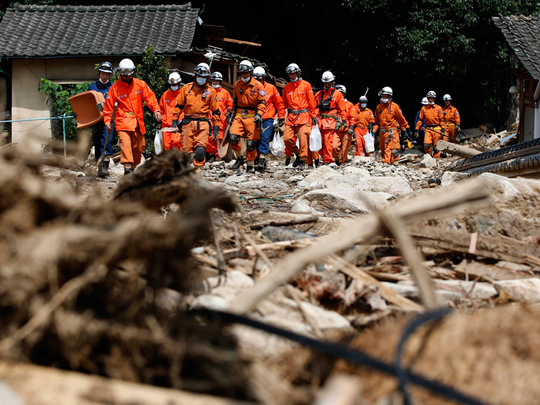
Tokyo Prime Minister Shinzo Abe now shares at least one thing in common with President Barack Obama: criticism for an ill-timed game of golf.
The Japanese leader, who was vacationing this week at a popular mountain resort town, faced continuing sniping from opposition lawmakers on Saturday for playing several holes of golf after deadly landslides earlier this week, instead of immediately returning to Tokyo to supervise the response. Those landslides on Wednesday, caused by heavy rains, left at least 42 dead and 43 others missing in the western city of Hiroshima, according to the latest official count.
Critics say Abe then made matters worse by going back to his resort home in the town of Karuizawa, instead of cancelling the rest of his vacation to oversee the ongoing rescue efforts. Opposition lawmakers said they planned to grill the governing Liberal Democratic Party about the prime minister’s actions next week during a meeting of a parliamentary committee on disaster response.
“How can he go back to his villa while there are still so many missing?” said Seiji Mataichi of the Social Democratic Party. “What poor judgement!”
The criticisms echo those faced earlier this week by Obama for playing golf while on vacation in Martha’s Vineyard just hours after going on television to denounce Islamic fighters for killing an American journalist, James Foley. While the president was apparently determined to show that he would not let the militants hijack his agenda, or his vacation schedule, critics said he looked callous toward Foley’s grieving family.
Rare misstep
In Japan, analysts said the hoopla over the golf game was unlikely to seriously hurt Abe. However, they said it did reflect a rare misstep by a conservative leader who has kept his approval ratings above a respectable 50 per cent by carefully cultivating an image of firm, competent leadership in a nation that has seen all too many ineffective prime ministers.
“This has been a bad week for leaders on the links,” Jeff Kingston, a professor of modern Japanese history at Temple University’s Tokyo campus, said in an e-mail. “Still, Abe is the most active premier in memory, constantly in motion, meeting world leaders and announcing new initiatives, so I don’t think Japan will begrudge him a brief break. Odds are he will visit the disaster zone soon, and this brouhaha will blow over.”
National attention has been gripped by the tragedy in Hiroshima, where continuing heavy rains have hampered the search for the missing. Many are feared to have been buried alive as they slept early Wednesday morning, when rain-soaked hillsides turned into rampaging walls of mud that destroyed entire neighbourhoods. The mounting death toll has made this one of the deadliest natural disasters here since the 2011 earthquake and tsunami in northeastern Japan that killed nearly 20,000 and caused the Fukushima nuclear accident.
On Friday, Abe’s defenders said the prime minister was able to receive regular updates about the emergency response even while getting what they said was some well-deserved rest from his highly demanding job. The prime minister defended himself by pointing out that he did not complete the entire 18-hole game of golf, which he was playing on Wednesday morning with three members of his Cabinet, but cut it short after just four holes.
“I cancelled the golf and returned to Tokyo, where I gave the orders that needed to be given,” Abe told reporters.
Still, the episode created an opening for opponents to fault the popular prime minister as being indifferent and out of touch. They seized on the fact that Abe himself has repeatedly invoked the need to be able to protect Japanese lives in arguing for bolstering Japan’s military capabilities and increasing security cooperation with the United States.
“The prime minister has been talking of protecting the citizens’ lives,” said Banri Kaieda, president of the opposition Democratic Party of Japan. “We wish he would take those promises a bit more seriously.”












